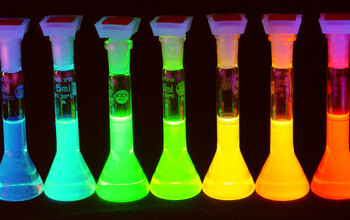NSF congratulates laureates of the 2023 Nobel Prize in chemistry

Samples showing quantum dot solutions emitting light at wavelengths across the rainbow.
October 4, 2023
3 scientists shared the prize 'for the discovery and synthesis of quantum dot technology.'
The U.S. National Science Foundation congratulates Moungi G. Bawendi, Louis E. Brus and Alexei I. Ekimov on their 2023 Nobel Prize in chemistry. The laureates discovered quantum dots and a method for reliably producing them at a high quality. Quantum dots are extremely small semiconductor particles (a few nanometers in diameter) that can have unique optical properties potentially applicable for a wide range of uses, including optical devices, solar cells, biomedical imaging and quantum computing.
NSF is proud to have supported the research and early-career development of Bawendi and Brus.
In 1991, Bawendi received an NSF Presidential Young Investigator Award, which helped support his breakthrough discovery. The Presidential Young Investigators Program, which later became the NSF Faculty Early Career Development Program, recognizes early-career researchers for their exceptional leadership at the frontiers of scientific knowledge. Bawendi’s subsequent work on the synthesis of quantum dots was directly supported by another 10 NSF awards and was enabled by the use of an NSF-supported materials research center and chemical research facility.
NSF supported Brus’s research career with multiple awards as well. He, along with Bawendi, received NSF Graduate Research Fellowships in 1966 and 1982, respectively. In 2005, Brus received a research grant to investigate single-wall carbon nanotubes. In 2011, he received support through NSF’s Integrative Graduate Education and Research Traineeship program to train the next generation of scientists and engineers in the field through research experience and mentorship.
The U.S. National Science Foundation propels the nation forward by advancing fundamental research in all fields of science and engineering. NSF supports research and people by providing facilities, instruments and funding to support their ingenuity and sustain the U.S. as a global leader in research and innovation. With a fiscal year 2023 budget of $9.5 billion, NSF funds reach all 50 states through grants to nearly 2,000 colleges, universities and institutions. Each year, NSF receives more than 40,000 competitive proposals and makes about 11,000 new awards. Those awards include support for cooperative research with industry, Arctic and Antarctic research and operations, and U.S. participation in international scientific efforts.
Connect with us online
NSF website: nsf.gov
NSF News: nsf.gov/news
For News Media: nsf.gov/news/newsroom
Statistics: nsf.gov/statistics/
Awards database: nsf.gov/awardsearch/
Follow us on social
Twitter: twitter.com/NSF
Facebook: facebook.com/US.NSF
Instagram: instagram.com/nsfgov


